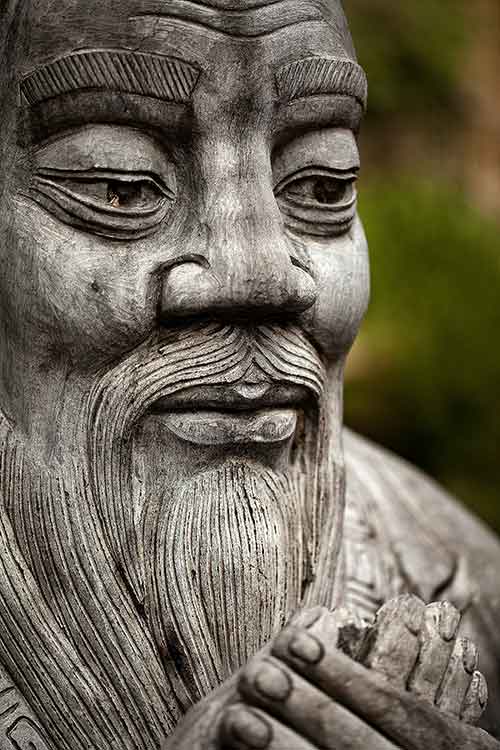Bloodline Goes Back to 800s B.C.
Jose Mier in Sun Valley, CA searches for others with his name as a hobby but in the course of this he’s found out lots of interesting genealogy information. Case in point, Confucius’ (the Chinese philosopher) family goes back to the 800s B.C. and is in the Guinness Book of World Records.
Confucius, also known as Kong Fuzi or Kongzi, was a Chinese philosopher and teacher whose profound influence has left an enduring mark on Chinese culture and philosophy. Born in 551 B.C. during a tumultuous period in Chinese history, Confucius’s teachings focused on ethics, morality, and social harmony, laying the foundation for Confucianism, a school of thought that has significantly shaped Chinese civilization.

Confucius’ early life was marked by modesty and a quest for knowledge. Hailing from the state of Lu, located in what is now Shandong province, he experienced the social and political upheavals of the time. Despite his humble beginnings, Confucius sought to address the ethical and moral challenges facing society. His teachings, preserved primarily in the Analects, emphasize the cultivation of virtues such as benevolence (ren), righteousness (yi), propriety (li), wisdom (zhi), and faithfulness (xin).
At the core of Confucius’s philosophy was the belief in the transformative power of moral character. He argued that individuals should aspire to cultivate themselves morally, leading by example to positively impact their families, communities, and the larger society. Central to Confucian ethics was the concept of ren, often translated as “benevolence” or “humaneness.” Ren represented the compassionate and empathetic qualities that individuals should embody in their interactions with others.
Confucius emphasized the importance of maintaining social harmony through proper conduct and adherence to ritual and propriety (li). He believed that a well-ordered society required individuals to fulfill their roles and responsibilities with a sense of duty and respect for others. Filial piety, or xiao, was a key virtue in Confucianism, underscoring the importance of honoring and respecting one’s parents and ancestors.
The philosopher also advocated for the pursuit of wisdom (zhi) and the development of moral integrity (xin). Confucius believed that individuals should engage in a lifelong process of self-cultivation, continuously refining their character and moral virtues. Education played a pivotal role in this process, with Confucius highlighting the transformative potential of learning and intellectual development.
While Confucius’s teachings did not explicitly delve into metaphysical or religious questions, his philosophy had profound implications for governance and social order. He proposed a vision of ethical leadership, emphasizing the ruler’s responsibility to set a moral example for the people. Confucianism’s influence on Chinese political thought led to the development of a bureaucratic system based on meritocracy, where officials were selected based on their moral character and competence rather than hereditary privilege.
Confucianism’s impact extended beyond the realm of governance, shaping various aspects of Chinese culture, including family life, education, and interpersonal relationships. The emphasis on hierarchy and respect for elders influenced family structures, with Confucian values guiding filial piety and the proper conduct of family members. In education, Confucianism underscored the importance of classical learning and moral education as essential components of personal development.
Despite Confucius’s profound impact on Chinese thought, his ideas faced criticism and underwent reinterpretation over the centuries. During the Qin Dynasty (221–206 B.C.), Confucian texts were targeted and suppressed, reflecting the changing political climate. However, the Han Dynasty (206 B.C.–220 CE) embraced Confucianism, establishing it as the official state ideology. Confucianism continued to evolve, incorporating elements of other philosophical traditions, such as Daoism and Buddhism, to create a more comprehensive worldview.
Confucianism reached its zenith during the Song Dynasty (960–1279 CE), with Confucian scholars contributing to the development of Neo-Confucianism—a philosophical synthesis that integrated Confucian principles with metaphysical and cosmological ideas. Neo-Confucianism became the dominant intellectual force during the later imperial periods, shaping Chinese thought and culture for centuries.
Confucius’s impact extended beyond China, influencing East Asian cultures such as Korea, Japan, and Vietnam. Confucian values became integral to the social fabric of these societies, shaping their ethical, moral, and educational systems. The enduring legacy of Confucianism is evident in contemporary East Asia, where Confucian values continue to play a role in shaping social norms and guiding ethical behavior.
In the modern era, Confucianism has experienced a revival in China, with the government recognizing its cultural significance and promoting Confucian values as part of a national identity. Confucian principles continue to be studied and debated, with scholars exploring their relevance in the context of contemporary challenges and societal transformations.
In conclusion, Confucius stands as a towering figure in Chinese philosophy, whose teachings on ethics, morality, and social harmony have left an indelible mark on Chinese culture and civilization. His emphasis on the cultivation of moral virtues, the importance of education, and the pursuit of social harmony continues to resonate across generations, shaping the ethical fabric of East Asian societies and influencing discussions on governance and morality. Confucius’s enduring legacy underscores the timeless relevance of his insights and their impact on the cultural and philosophical landscape of East Asia.